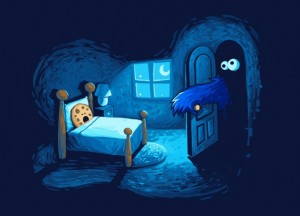Sometimes God puts certain people in your life to show you how you’re screwing up and how to fix it. Sometimes, these guardian angels are disguised as people who need YOUR help. This post is about one such man.
Mood music:
[youtube=http://www.youtube.com/watch?v=wyb7dt9nz_g&fs=1&hl=en_US]
In 12-Step programs anonymity is a big deal, especially in OA, because there’s an extra level of awkwardness that comes with being a binge-eating addict. So I’m changing this friend’s name to Dan.
I first talked to Dan on the phone a few months ago. He got my number from someone else in program and called me out of the blue. I picked up the phone and heard the following:
“Hiya Bill. My name’s Dan and I’m a compulsive overeater!”
The exclamation mark is appropriate, because that’s how he said it.
He proceeded to tell me that he needed a sponsor and I was it.
“Uh, ok,” I said. I had just started sponsoring and this guy was asking for help, so in I went.
The first time I met him in person, I was picking him up for a Saturday-morning OA meeting. He’s so obese that he needed help getting the seatbelt on. His legs were purple from diabetes.
“This guy is going to be a lot of work,” I thought.
Then, at the meeting, I start to realize that he knows a lot of people there. He was greeting and hugging people like it was old home week. It turned out that he had been in OA before.
What’s more: He was a 20-year veteran of AA. He had done it all. He was once a drunk and a drug addict. He shot heroin. He had lost just about everything. After kicking booze and drugs, he turned to the food. He needs a truck scale to weigh himself and last time he did, he was an even 400 pounds.
But it didn’t matter. He was and still is one of the more cheerful people I’ve ever met.
And since then, of all my sponsees, nobody works the program as hard as he is. We talk every morning. Sometimes we talk several times a day. He’ll bend your ear for hours if you let him. Sometimes, it can get exasperating.
Here’s the problem: I can be a selfish, egotistical bastard. It’s not hard for me to think I’m better than other people, especially a 400-pound 50-something who lives in a room the size of my walk-in closet. And my ego is probably too big to weigh on a truck scale.
I’m pretty sure that’s why God put Dan in my life. That’s what He does, you know: puts people in your life who will help you, but he sneaks them in as people who need YOUR help.
Ever see “It’s a Wonderful Life?” It’s like the angel Clarence. He dives in the water and acts like he’s drowning so George Bailey, who is standing on the bridge contemplating suicide, will jump in and save him.
I guess you could call what I’m experiencing the Clarence Syndrome.
Dan, you see, is teaching me a lot more than I’m teaching him. I may be his OA sponsor, but he’s my own Clarence.
As a 20-year veteran of 12-Step programs, he knows every current and former junkie on the streets of Haverhill. We’ll drive up Winter Street or down River Street and he’ll point out every person walking the streets as we pass. He’s seen them all in AA meetings. He’ll tell you their full history and how they’re doing today.
He’s also taught me that people in AA are NOT the same as people in OA.
We have the big things in common. We developed addictions that made our lives unmanageable. Having found recovery, we latch onto each other pretty tight.
But something’s different.
In OA, there’s a tight fellowship in meetings and on the telephone. But the AA crowd really sticks together. It’s more like a gang. Recovering addicts often live together, several in a house. Not a halfway house. They just live together, watching out for each other.
It’s cool to see. But I’ve also found that there are some real animosities among the AA crowd. Another of my sponsees, an OA drop-out for now, spent a lot of time telling me about how I shouldn’t trust this person or that person because one likes to tell lies and the other likes to steal money. The lying part didn’t shock me. All addicts lie.
Come to think of it, Dan warned me that this other person does the same things and shouldn’t be trusted. Ah, the webs we weave.
Dan gives people nicknames. There’s Happy Harold, New York Mikey (called that because he has a pimped-out car with New York plates) and Georgie-B.
He’s always bringing new people into AA. He calls them prospects.
That was one of my first lessons: He’s not just a poor obese boy living in a box. He gives freely, helping others every day. He doesn’t have a job, but he fills his time in meaningful ways.
I’m better than him? Hell, no. He’s taking ME to school. He’s so busy looking for my guidance in OA that he doesn’t seem to realize it.
Don’t tell me God doesn’t have a sense of humor. 
It’s been a powerful, humbling lesson for me about not judging a book by its cover or thinking of yourself as above others.
We’re all in the same struggle for redemption. And God keeps giving us a shot at it by sending along guardian angels disguised as people “worse off” than we think WE are.
The trouble is, we’re often too blind and/or stupid to see it.
I know I was.



